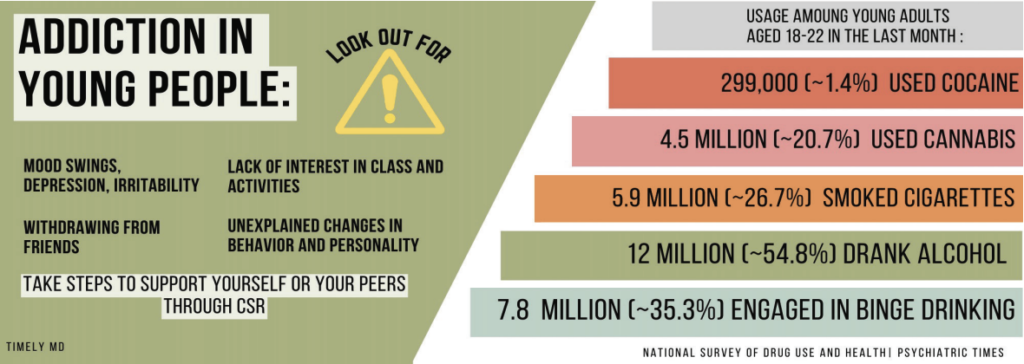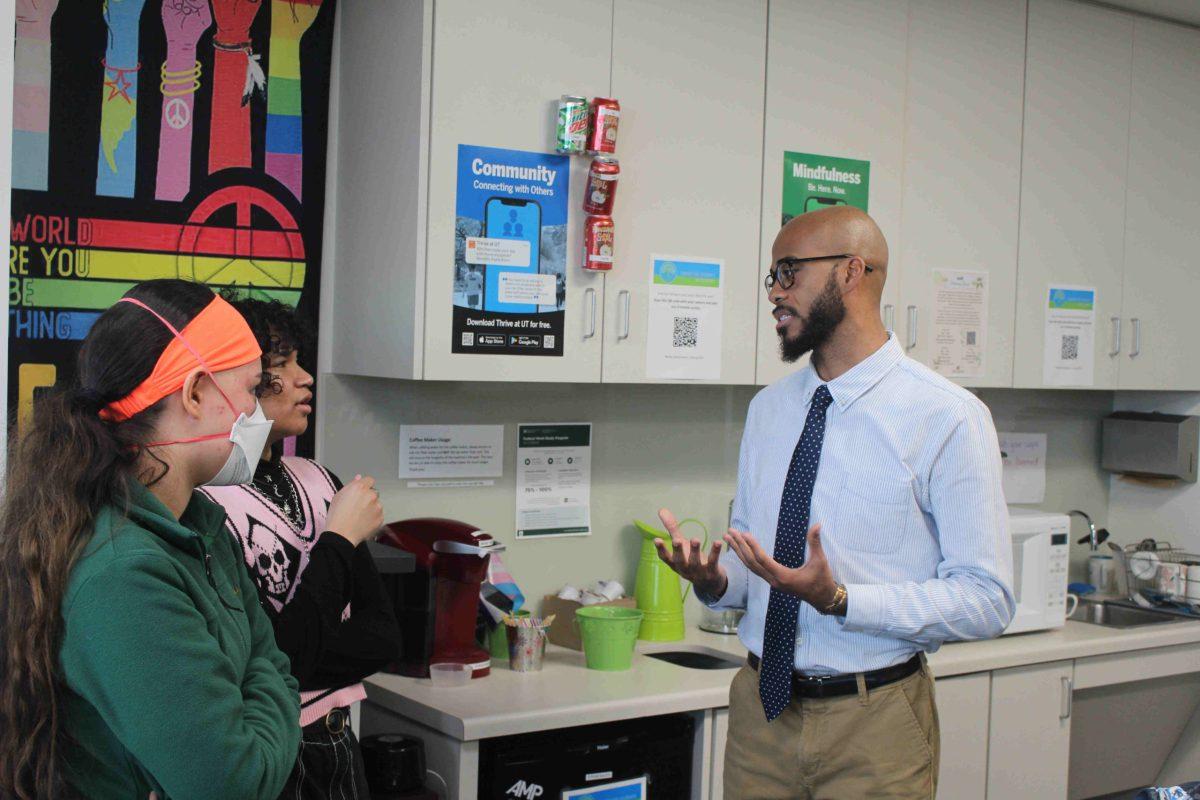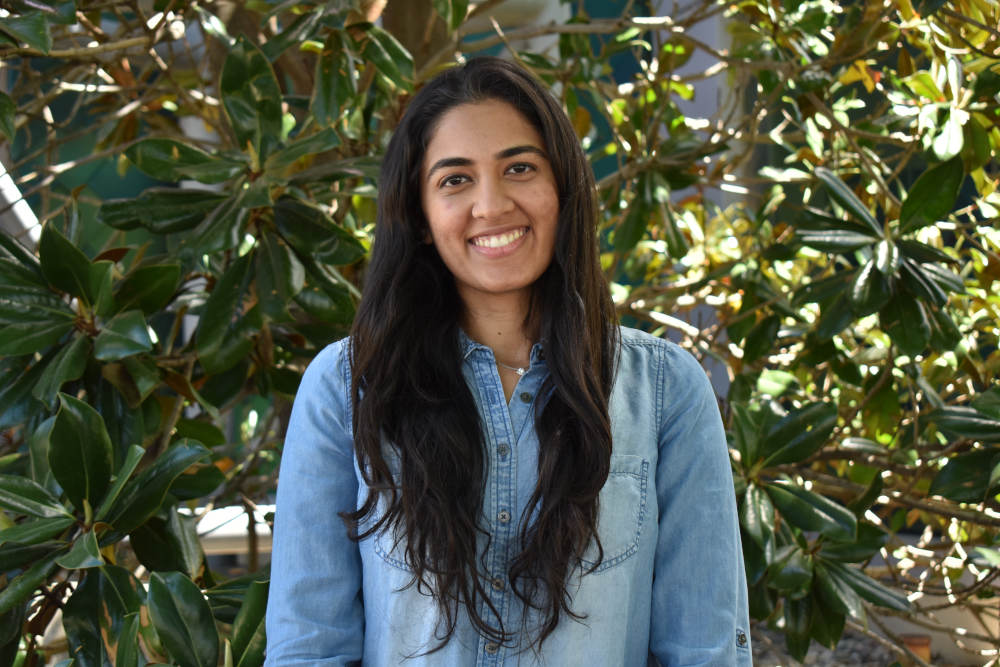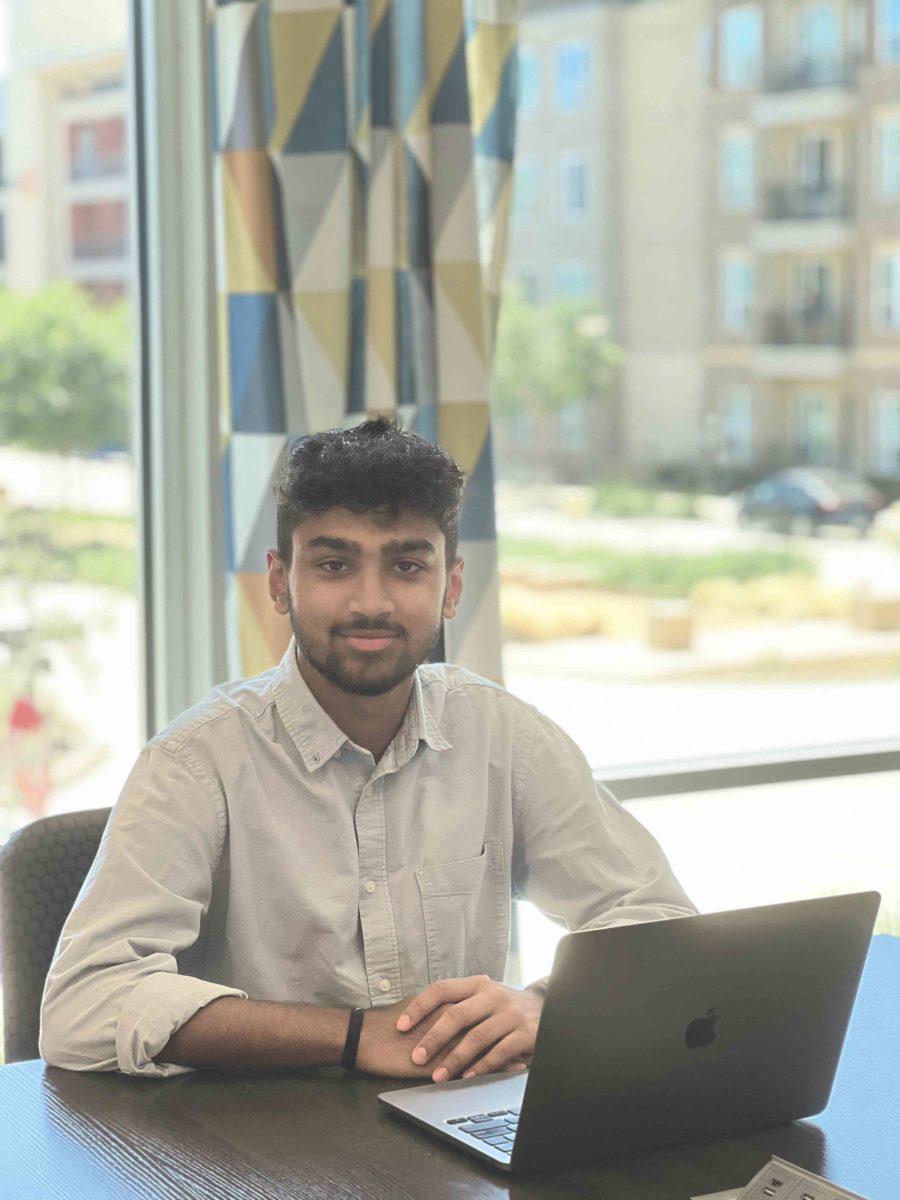When molecular biology senior Kevin Juarez mistakenly walked into the Center for Students in Recovery, they were expecting to turn around, close the door and continue looking for the Wellness Center. Instead, Juarez was welcomed by a warm presence that would lift them up in their time of need and draw them to return – Jeremy Hall.
Genuine. Impactful. Healing. These are the words Juarez and countless other Comets use to describe Hall, the admin project coordinator for CSR, a branch of the Student Counseling Center that aids Comets struggling with addiction and compulsive behaviors. In the short time he’s been on campus, Hall has established himself as a guiding force in the community and an advocate for students. His goal – support students in whatever way he can.
Spaces like CSR are especially important on college campuses. According to AddictionCenter, 80% of college students have abused substances like alcohol, and according to FinancesOnline, one in four college students currently meet the criteria for substance abuse. A critical part of the recovery process that is often overlooked is community. And with 1,400 students having visited the CSR in fall 2022 alone, the center has established itself as a safe haven for students.
“This is a judgement free zone for students to be who they are, and take off the mask,” Hall said. “I can’t stress enough how important it is for people in recovery to have a good system with positive influences. This is one of the biggest factors in helping someone recover. It’s important to have that space for authenticity. It’s about unity and togetherness – we’re stronger together in CSR.”

CSR – located in SSB 4.500 – offers services such as recovery groups led both by peers and by Hall, one-on-one recovery meetings, sober social activities, naloxone trainings and weekly specialized programming for disordered eating, substance use disorders and behavioral disorders. These free services are available to both students and the public, and the center also offers therapy with new director and licensed social worker Kay Solomon. In addition to coordinating and organizing programming and events, Hall works to provide psychoeducation to students, aided by his background in therapy and philosophy. Hall was recognized in December by Student Affairs for going above and beyond in his contributions to Comets’ wellbeing.
“If you have met Jeremy Hall, you absolutely remember Jeremy Hall,” a nomination said. “Jeremy is one of the friendliest and passionate people and this translates to all of his work and interactions here at UTD … [He’s] shown innovation in his way of marketing the CSR and trying to get students through the door. When students are there, they report feeling a sense of acceptance, ease and connection within the center – all things we know contribute to improving our mental health, and I can’t help from believing this is in part because Jeremy’s presence and his genuine care of students … He is one of a kind and truly valued.”
But CSR wasn’t always this welcoming. Before spring 2022, the center was practically empty. Few students stopped by every semester, and the fresh return from the pandemic wasn’t helping attendance. CSR had not established itself as a notable resource for students on campus. It was around this time that Hall came on the scene as the new project coordinator.
“All of this was really created by Jeremy,” neuroscience freshman Michelle Beakley said. “His approach comes from an empathetic lens. He makes sure this is a safe comforting environment and that students get what they need for any problems they have. Even outside the center, you’ll probably run into him somewhere on campus because he puts himself out there. He’s always interacting with students wherever he can – talking with them, but also listening.”
Before coming to CSR, Hall worked as assistant vice president for Bank of America, making six figures annually. But he was dissatisfied – while financially secure, he knew there was something greater inside him. Hall had always had a passion for teaching young people, so he put in his two weeks and began looking for mentorship positions.
“The people at HR were impressed but didn’t believe that I’d want to work here because I was overqualified,” Hall said. “But I was adamant about my interest. I wanted to do what makes me happy – and that’s save lives and impact lives. It’s not about the money. And to be in a position where I can do that is beautiful. I went through terrible abuse as a child, which really shaped me and gave me the strength to do the job I do today and relate with students’ experiences. I had a teacher help me through that time – letting me know nothing’s wrong with me, healing me, building me up for success. Doesn’t matter who you are, I want students to know the same can be done for them.”
With community such a critical part of recovery, the center is especially important for students in need of a place where they feel like they belong.
“Honestly, CSR is pretty much the only place I’ve ever felt like I’ve belonged at the university,” Juarez said. “This community we’ve cultivated through Jeremy has been so helpful, so healing. To this day, that stands true.”
Juarez’s friend Beakley joined CSR in fall 2022 to complete Narcan Training, a program teaching Comets how to use Naloxone to save someone’s life during an opioid overdose. Beakley also participates in recovery groups, where she said Hall advocates for students to support other students. For example, “Nourish” is a weekly recovery group for eating disorders led by Darcy Wallace – one of the Center’s student workers – who has personally struggled with disordered eating in the past.
“It’s stressed in CSR that you need to feel represented by the people who are helping you,” Beakley said. “If Jeremy doesn’t know something, he tries his best to educate himself and I just really admire that about him. He’s the kind of person who loves to have philosophical conversations with people. You can tell just by talking with him that he is a very smart person and I always take something valuable away from our talks. He has that effect.”
Hall thanks student workers at the center for helping him transform CSR into what it is today. Takeru Kitagawa-Barnes is one of two student workers at CSR that assist with programming and spend time in the center comforting students. Kitagawa-Barnes joined the center because he had a friend in high school who struggled with disordered eating. At the time, Kitagawa-Barnes didn’t know how to support his friend, so he wanted to become knowledgeable about eating disorders in college.
“I’ve heard a lot of different folks feel like, you know, the school’s indifferent to our needs and us as individuals outside of just being another student,” Kitagawa-Barnes said. “It’s hard to find genuine people. And with Jeremy, it’s just the complete opposite and it’s kind of the culture that he’s helping to foster within our pocket of CSR.”
Outside of his work at CSR, Hall is involved with the Comet Cupboard, Eco Hub, Office of Sustainability and Student Wellness Center, as well as many student organizations. For example, Hall was involved with Radio UTD, a branch of Student Media, last semester, when he spoke live on-air with student hosts on topics including mindfulness, ADHD and suicide prevention. This semester, Hall plans to continue on-air chats through a new Radio UTD show, Music Therapy, which will air Wednesdays from 10 a.m. to 11 a.m. at radioutd.com/tuner.
Going into spring 2023, Hall hopes to expand CSR to even more students and work on implementing new programs that students have suggested, like a support group for friends and family of addicts. Students who are seeking a particular service or just want to connect can message CSR on Instagram at the handle @utd_csr or join the Discord. A full list of programming can be found on CSR’s website.
“You. You’re the reason I do this,” Hall said. “What inspires me is all of [y’all]. If you’re feeling shy, it’s okay. If you need help, CSR is going to be there for you.”



